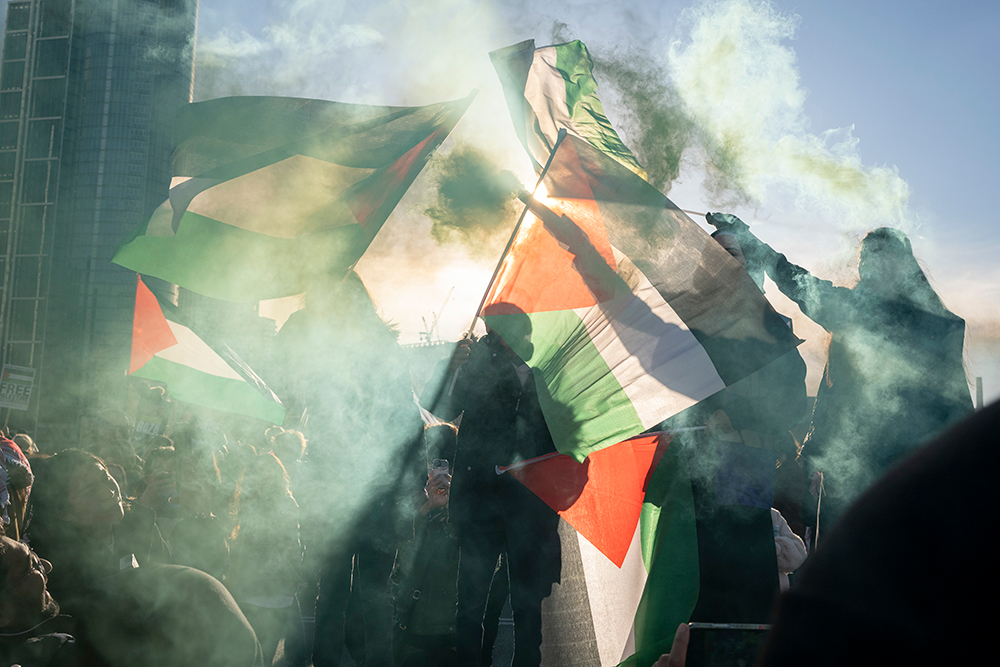In public events, I’ve sometimes given an unexpectedly appreciative nod to the hard left. It’s laudable, I allow, to stick up for the disadvantaged. Young people naturally hope to revamp the creaky, hypocritical institutions they inherit, just as my generation did in the 1960s. Fairness – a more complex concept than it first appears – is inherently appealing. Thus the initial impulse to embrace identity politics is often benign.
This concession is calculated. Being charitable carves out space for me to rip this odious ideology to shreds thereafter. Yet given that when younger I was a fervent liberal American Democrat, my token peace offering has always been sincere.
I take it back. After all the identitarian left’s defence of peoples historically wronged, all their horror of the ‘violence’ in silence or biologically correct pronouns, all their advancement of ‘diversity and inclusion’ – which you would suppose would encompass all religions and all minorities, especially the persecuted ones – ghoulish celebrations of Hamas’s throat-slitting melee in southern Israel last month among some western ‘progressives’ were incomprehensible at first. But on reflection, the BLM brigade joining the ghastly Muslim chant of ‘Glory to our martyrs’ makes perfect sense.
Does this clamorous crowd seem happy? Are they enraptured by visions of a better world?
Let’s put aside the numbing jargon of this movement, and let’s put aside its dogma. I’m a novelist, and literary writers do deal in language and ideas, but most of all we deal in feelings. So never mind what they say or what they claim to believe. What emotions emanate from Hamas’s ‘useful idiots’? Does this clamorous crowd seem happy? Are they enraptured by visions of a better world? Given that the hard left’s rhetoric gestures (if condescendingly) towards the uplifting of the downtrodden, do its activists exude kindness, tenderness and compassion? Are they visibly bursting with love for their fellow man? Do we see the gleam of a radiant future glinting in their puppy-wide eyes?
Like many Speccie readers, I’ve followed the ‘culture wars’ closely for years, so to cheerfully overgeneralise – or simply to generalise – let’s itemise the emotions that overwhelmingly preponderate identitarians’ marches, oratory and screeds.
Free-floating fury – though exactly what they’re so angry about is a bit obscure. Anger does have an energising side, but it’s corrosive. Anger is a battery acid that eats you up.
Hatred. Beware folks who ceaselessly decry ‘hate’ while as ceaselessly spewing antipathy themselves, whether despising ‘white supremacists’, another name for ‘white people’, or ‘Israeli colonisers’, another name for ‘Jews’.
Vengefulness – which has a certain crude logic when manifested in minorities who feel hard done by, although many of the shrillest minority voices on university campuses hail from prosperous families. Opportunistic advocates of Critical Race Theory such as Ibram X. Kendi have done terribly well for themselves. Vengeance for what, then? Ditto affluent white wokesters: where’s the beef? A thirst for vengeance runs contrary to a desire for a better world, which would certainly involve less vengeance.
Resentment. Younger generations are bludgeoned with doom. They will never own property. They will be replaced by AI. The Earth will erupt into a giant fireball within their lifetimes. They will be poorer than their parents. Besides, people of all ages are often tortured by the suspicion that others out there are leading more satisfying lives than theirs. But resentment just sits there. It doesn’t improve matters. It’s a befouling, inert sensation, akin to the experience of lying in your own excrement and never changing the sheets.
Mercilessness. This unforgiving movement is Old Testament. It’s all damnation without redemption. The public apology simply invites a greater pile-on. And it believes in predestination: if your skin is on the pale side, you’re going to hell.
Aggressiveness. They’re bullies.
Cynicism, if not nihilism. Traditionally, the left was naively utopian. This left is apocalyptic. No sunlit uplands await, once we’re all anti-racists who accept there are 3,042 ‘genders’ and counting. Rather, modern progressivism needs racism to have purpose, so will invent prejudice where none exists if need be; ‘systemic racism’ is gloriously ineradicable. Even climate fanatics don’t believe net zero will succeed. They’re in thrall to a pending holocaust of humanity, which they seem to be looking forward to.
Sadism. The sole positive emotion these people evidence is delight in ruining the lives of others. ‘Cancel culture’ is a blood sport.
All these emotions are dark. This is a movement without humour and without joy. It is anti-everything and pro-zilch (the emotion driving support for Palestine is loathing for Israel). No wonder it’s in league with Hamas. It’s anti-life.
In a recent appearance, I submitted guiltily that my boomer generation may have originated identity politics, and a woman about my age objected to me afterwards: ‘But we weren’t like that!’
I took her point. The difference? We had fun. We had great music. We took drugs, to further exoticise the exhilaration of being alive. Yes, we went to protests. Yes, we were intoxicated by self-righteousness. Fancying ourselves mavericks, we were also conformists, in uniforms of beads and bell-bottoms. We said lots of stupid stuff. I declared at dinner at 14 that the entire US Defense Department should be eliminated, and even my peacenik parents chorused: ‘Well, I don’t know about that!’ In America, it was a time of farcical foolishness and unfeasible idealism mixed with the well-founded fear that you or your brother would land in Vietnam and genuine grief over the assassinations of Martin Luther King and RFK. Yet the largely unserious revolutionism of the 1960s was buoyant, exuberant, upbeat. The lingo was goofy but ebullient: groovy, far out, sock it to me, baby!, which sure beats rape culture and heteronormativity. Whatever our vague intention to transform the future, we were bent on having a good time in the present.
As a rule, note not merely what activists assert, but which emotions infuse the message. This latest iteration of Elvis Costello’s ‘peace, love and understanding’ is bleak. It’s a hostile, vicious, dismal and destructive gestalt with no vision of some resplendent new world that will rise from the ashes. Relishing the beheading of babies fits right in.







Comments